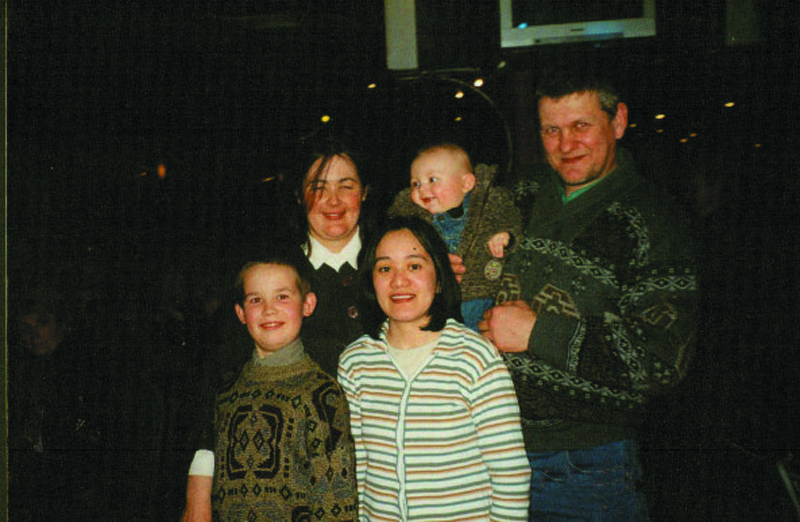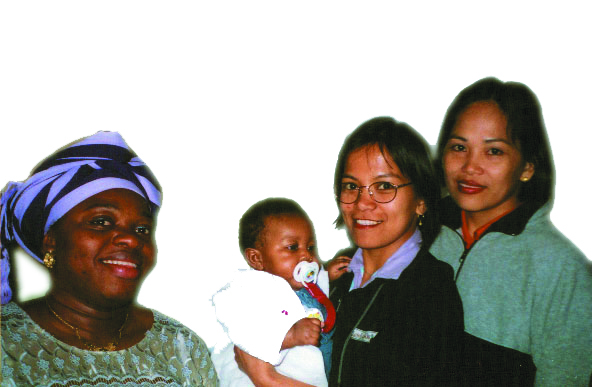A Stranger Befriending Strangers
By Gracia Kibad
Gracia Kibad, a Columban lay missionary from Bauko, Mountain Province, is now in her third term in Ireland.
In my second term in Ireland I was assigned to Ashbourne (www.ashbournedonaghmore.com), Meath. The recent waves of migration have brought people from many countries to its doors, making Ireland at this time particularly interesting.

Gracia with the Batorov family
Being a foreigner, I was faced with my own uniqueness whenever I encountered those different from me in color, language and culture. Living in a multicultural community called for a deeper affirmation of my identity as a Filipina.
My initial involvement with the residents was accidental. Parish priest Fr Jim Lynch, who worked in Zambia for a while, chats with newcomers he meets on the street and used to tell me who he’d met. As a stranger in a different culture, I felt a certain concern for these. Soon I found myself keeping in touch with them. When I’d see someone who looked like a migrant I’d just go and talk to them. This wasn’t easy for me as I didn’t want to be mistaken as ‘nosey.’ But I learned on mission to do the unusual. It’s great to be a ‘foreigner’– there’s always room for some ‘oddities.’
Spirit of Welcome
I came to know and befriend people, some Muslim, some Christian, from places such as Kosovo, Latvia, Lithuania, Nigeria, Zimbabwe, Ukraine, Moldova – and the Irish themselves. Around this time, the parish set up a team to welcome new people in the community. At first we linked up with the national ‘KNOW RACISM’ program but later called ourselves the ‘Ashbourne Welcoming Group.’
We organized Masses to welcome migrants, and also held coffee-mornings and similar get-togethers, to which locals came. Parishioners appreciated these initiatives that allowed for a more open encounter between people who didn’t know much about each other but who wanted to. I also welcomed people to my own place. Hospitality was one thing I was able to offer and I saw it as one aspect of being on mission.
I also visited people in their homes and always got a warm welcome. Our difficulty in speaking English was something that made these encounters more interesting and challenging.
Slices of life
I remember visiting the Batorov family from Ukraine. The husband worked in a local factory. Since their arrival in Ireland, they’d had a baby who was baptized in the parish church. Mrs Batorov knew very little English. We were trying to communicate through ‘sign language’ when their 8-year-old son arrived from school. Thanks be to God for an efficient Irish school system. After less than a year in school his English was perfect. Immediately he ‘got a job’ as our interpreter. On top of that, this huge, gentle Ukrainian woman persuaded me to have dinner with the family. As with Filipino hospitality, no matter how little people have, there’s always something to eat for whoever comes to the door unexpectedly. And so it is with the ‘cuppa,’ as the Irish call a snack over a cup of tea. When I was leaving Ashbourne, the whole Batorov family came to my despedida. To my delight and surprise, they handed me a framed painting.
I got to know a Kosovar, a friend of Save, a Fijian Columban lay missionary in Ashbourne before. Every time we chatted, he’d tell me something about his dear homeland, Kosovo, and his family and friends, alive and dead. Being away from home myself I could imagine the pangs of loneliness and homesickness he felt, how much more for this man who had to flee home for his life. For him Kosovo would always be the longed-for place, yet not knowing when it would be safe to go home to.
One evening, I decided to drop by the apartment where he lived with his wife. When he opened the door he looked so upset and tears began to roll down his cheeks. I tried to calm him. He had been watching TV that evening and recognized a friend of his being captured. I couldn’t fully understand what he was saying because of his difficulty in speaking English, but I gathered that his friend had been betrayed. He was distraught at his helplessness in the situation. I stayed for a while till he was calm. Stories such as these make me wonder what we as a human race are doing to our own. And we don’t really know how people are till we listen to their stories and try to understand them.
Lessons in cultural diversity

Sylvia and baby Angelica with two Filipino migrant workers, Maria Isabel and Maria Agnes
Before I left Ashbourne, my Kosovar friend and his wife came to say goodbye. With sadness in his eyes he said, ‘At least you can go home.’ I now understood those words, having learned a part of his story. As I reflected on them, I could say that indeed I was blessed, as home is always there for me, a home that is safe, where I’m assured of a warm welcome and open arms from my family, friends, relatives and community.
Another friend was Sylvia, from Nigeria, with a baby girl named Angelica. She often came to my house and sometimes I’d cook us a meal. One afternoon when Sylvia was at my place the children from the neighbourhood, regular visitors whom I called my ‘little friends,’ dropped by. I introduced them to her. Baby Angelica was in my arms and when they saw her they wanted to give her a cuddle. How spontaneous children can be, the color of one’s skin meaning nothing to them!
The experience of living in a multicultural setting certainly opened my eyes. It was an opportunity to interact with peoples of other cultures. It brought home to me the richness of the diversity of cultures. I certainly have learned so much about people and their aspirations, their cultures and countries. I learned something about life.
You may email Gracia Kibad at gayak911@yahoo.ie or write her at
St Columban’s, Dalgan Park, NAVAN, Co Meath, IRELAND.